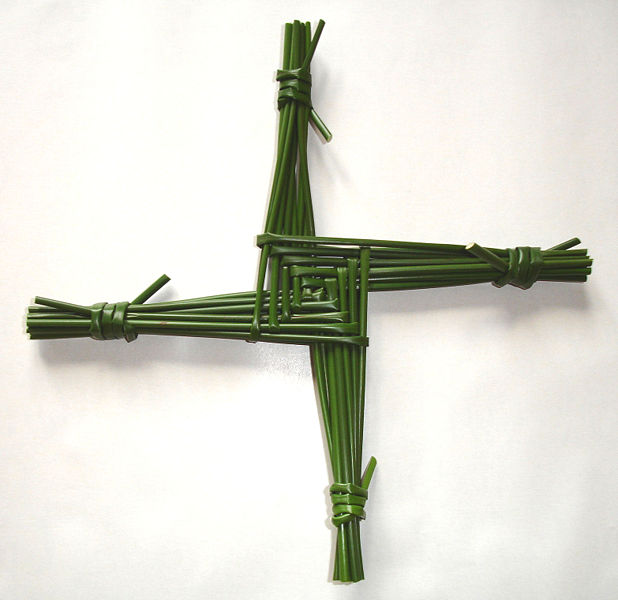Everyone is familiar with the celebration of Saint Patrick on March 17. He is considered the patron saint of Ireland (along with St. Columba), but there is also St. Brigid, whose commemoration we celebrate today.
Brigid was born in 451 A.D. to a Christian mother who was a slave to a married chieftain, thus rendering Brigid herself a slave. When the chieftain found Brigid’s mother was pregnant, he sold her to a Druid. After her birth, the infant and then the child was unable to tolerate anything from the Druid’s kitchen. In the end, it is said, they had to get a white cow with red ears to provide food for her, and this cow’s milk was the only kind of food she could tolerate. At the age of ten, she was returned to her original master, the chieftain, who was also her father.
From all accounts, Brigid was a very kindhearted child, seeing needs, and trying her best to fulfill as she was able. If she met someone who needed shoes, she gave her own or would help herself to her stepmother’s clothes and shoes when needed to help the poor. If she found hungry people, she gave from her father’s storehouses and gave away staples like bread, butter, and other goods so that the hungry could eat.
Finally, the chieftain had enough and took her to the court of the King of Leister, with the hope that the king would buy her. At the court, somehow, she acquired the king’s jeweled sword, which she gave to a poor man to barter with so that he could feed his family. Oddly enough, the king was a Christian who recognized the spirit of generosity in the young girl, asked her father for her freedom, and stated that her mercy was greater than any others before God. Her kindness seemed to be unending and, although a terrible trial for her family, it was a great help to those for whom she acquired goods.
She returned to her mother and the Druid’s house after she gained her freedom, and it is said that she prayed that her beautiful face would be made ugly so that no man would wish to marry her. She had taken a vow of chastity, and had also heard St. Patrick preach. It is said that the saint heard her final vows in the monastery and that Patrick used the form of final vows and consecration for a male. His monks, aghast at his error, hurried to tell him of the mistake he had made but Patrick responded that she was destined for great things.
Brigid went on to found two monasteries, one for men and one for women. In addition to the usual monastic works, she also established a school for the arts, including illumination and metalworking. She remained in contact with Patrick for the remainder of her life, a life that ended in 525 AD.
Where are the St. Brigid’s among us? I am not sure that many would go to the lengths Brigid did, taking things from her wealthy family and others to supply the needs of the hungry, the naked, or the needy. Many of us, if not most of us, have much more than we need. I know I have drawers full of things that I may use again one day, but possibly not. I’m wary of throwing stuff out because as soon as I do, I seem to need the same item sometime in the next few weeks and have to go out and repurchase it. There are books that I know I should get rid of, but it is tough to get rid of theology books; they don’t seem to be in high demand like Harry Potter or romance novels or even a bunch of cozies. Still, I have things that I need to get rid of, and I might benefit someone else, so maybe I ought to practice being St. Brigid in the coming weeks and find homes for things that I won’t use or wear again to make room for some zen to move in.
Generosity is a gift from God; we receive his God’s grace abundantly and without asking. Isn’t it about time that we started practicing passing that grace on in whatever tangible ways we can? If money is tight, perhaps contributing cookies to a bake sale to benefit charity work, helping at a food bank, or maybe making peanut butter sandwiches to pass them to beggars on the street corners who proclaim their hunger. Perhaps they’re just scamming, but at least it’s a token way of trying to meet a small bit of the world’s need. There are lots of ways we could do this if we just would.
Jesus said, “Blessed are the merciful, for they shall obtain mercy.” Brigid certainly was compassionate, and beloved for acts of kindness. Maybe we never make ourselves saints, but a few good works certainly wouldn’t hurt in this world where such actions seem to be becoming fewer and further between.
This week I will do some St. Brigid work. It’s the least I can do. Maybe I could knit some scarves for people standing out on the street in the cold. Heaven knows I have a lot of spare yarn to use up. And do I actually need multiple t-shirts in different shades of blue that have been hanging in the closet for a year or more?
Image: St. Brigid’s Cross, made from rushes from County Down. Artist: Culnacreann (2008). Found at Wikimedia Commons.
Linda Ryan is a co-mentor for an Education for Ministry group, an avid reader, lover of Baroque and Renaissance music, and retired. She keeps the blog Jericho’s Daughter and is staff to her cats, Gandhi, Dominic, and Phoebe.

